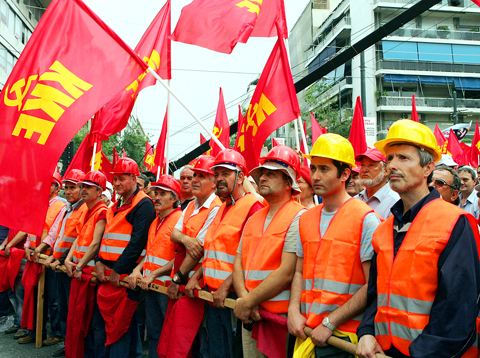Greece is considering taking legal action against US investment banks that might have contributed to the country’s debt crisis, Greek Prime Minister George Papandreou said.
“I wouldn’t rule out that this may be a recourse,” Papandreou said, in response to questions about the role of US banks in the crisis, in an interview on CNN’s Fareed Zakaria GPS.
The program, scheduled for broadcast yesterday, was taped on May 13. Neither Papandreou nor Zakaria mentioned any banks by name.

PHOTO: EPA
US stocks fell and the euro slumped on concern that Europe wouldn’t be able to contain the debt crisis stemming from Greece. The Standard & Poor’s 500 Index declined 1.9 percent on Friday, while the euro fell below US$1.24 for the first time since November 2008.
INVESTIGATION
Papandreou said the decision on whether to go after US banks would be made after a Greek parliamentary investigation into the cause of the crisis.
“Greece will look into the past and see how things went,” Papandreou said. “There are similar investigations going on in other countries and in the United States. This is where I think, yes, the financial sector, I hear the words fraud and lack of transparency. So yes, yes, there is great responsibility here.”
In the days leading up to the May 10 announcement of a loan package worth almost US$1 trillion to halt the spread of Greece’s fiscal woes, EU regulators were examining whether speculators manipulated the prices of bonds and equities and contributed to the crisis.
VOLATILITY
The Committee of European Securities Regulators said on May 7 it was investigating “exceptional volatility” in the markets and would work with other regulators, including the US Securities and Exchange Commission, as part of a coordinated clampdown.
European Central Bank President Jean-Claude Trichet said on May 6 that he was concerned about speculation in bond markets using credit default swaps (CDS).
“By first buying the CDS and then trying to affect market sentiment by going short on the underlying bond, investors can make large profits,” he said.
NAKED SWAPS
Credit default swaps are derivatives that pay the buyer face value if a borrower — a country or a company — defaults. In exchange, the swap seller gets the underlying securities or the cash equivalent. Traders in naked credit default swaps buy insurance on bonds they don’t own.
In the CNN interview, Papandreou said many in the international community have engaged in “Greek bashing” and find it easy “to scapegoat Greece.” He said Greeks “are a hard-working people.”
“We have made our mistakes,” Papandreou said. “We are living up to this responsibility, but at the same time, give us a chance. We’ll show you.”

MORE VISITORS: The Tourism Administration said that it is seeing positive prospects in its efforts to expand the tourism market in North America and Europe Taiwan has been ranked as the cheapest place in the world to travel to this year, based on a list recommended by NerdWallet. The San Francisco-based personal finance company said that Taiwan topped the list of 16 nations it chose for budget travelers because US tourists do not need visas and travelers can easily have a good meal for less than US$10. A bus ride in Taipei costs just under US$0.50, while subway rides start at US$0.60, the firm said, adding that public transportation in Taiwan is easy to navigate. The firm also called Taiwan a “food lover’s paradise,” citing inexpensive breakfast stalls

TRADE: A mandatory declaration of origin for manufactured goods bound for the US is to take effect on May 7 to block China from exploiting Taiwan’s trade channels All products manufactured in Taiwan and exported to the US must include a signed declaration of origin starting on May 7, the Bureau of Foreign Trade announced yesterday. US President Donald Trump on April 2 imposed a 32 percent tariff on imports from Taiwan, but one week later announced a 90-day pause on its implementation. However, a universal 10 percent tariff was immediately applied to most imports from around the world. On April 12, the Trump administration further exempted computers, smartphones and semiconductors from the new tariffs. In response, President William Lai’s (賴清德) administration has introduced a series of countermeasures to support affected

CROSS-STRAIT: The vast majority of Taiwanese support maintaining the ‘status quo,’ while concern is rising about Beijing’s influence operations More than eight out of 10 Taiwanese reject Beijing’s “one country, two systems” framework for cross-strait relations, according to a survey released by the Mainland Affairs Council (MAC) on Thursday. The MAC’s latest quarterly survey found that 84.4 percent of respondents opposed Beijing’s “one country, two systems” formula for handling cross-strait relations — a figure consistent with past polling. Over the past three years, opposition to the framework has remained high, ranging from a low of 83.6 percent in April 2023 to a peak of 89.6 percent in April last year. In the most recent poll, 82.5 percent also rejected China’s

PLUGGING HOLES: The amendments would bring the legislation in line with systems found in other countries such as Japan and the US, Legislator Chen Kuan-ting said Democratic Progressive Party (DPP) Legislator Chen Kuan-ting (陳冠廷) has proposed amending national security legislation amid a spate of espionage cases. Potential gaps in security vetting procedures for personnel with access to sensitive information prompted him to propose the amendments, which would introduce changes to Article 14 of the Classified National Security Information Protection Act (國家機密保護法), Chen said yesterday. The proposal, which aims to enhance interagency vetting procedures and reduce the risk of classified information leaks, would establish a comprehensive security clearance system in Taiwan, he said. The amendment would require character and loyalty checks for civil servants and intelligence personnel prior to